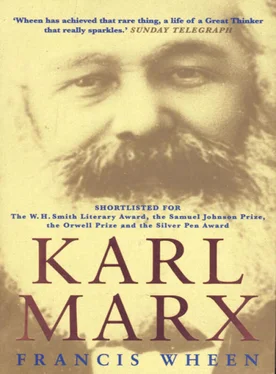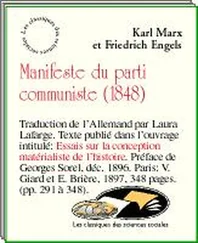1 ...7 8 9 11 12 13 ...26 It is easy to overlook the obvious,which may be why so few writers on Marx have noticed what is staring them in the face: that he was, like Esau, an hairy man. In the recollections of those who knew him, however, the awe-inspiring effect of that magnificent mane is mentioned again and again. Here is Gustav Mevissen, a Cologne businessman who invested in the Rheinische Zeitung in 1842: ‘Karl Marx from Trier was a powerful man of twenty-four whose thick black hair sprang from his cheeks, arms, nose and ears. He was domineering, impetuous, passionate, full of boundless self-confidence …’ And the poet George Herwegh, who came to know Marx in Paris: ‘Luxuriant black hair overshadowed his forehead. He was superbly suited to play the role of the last of the scholastics.’ Pavel Annenkov, who encountered Marx in 1846: ‘He was most remarkable in his appearance. He had a shock of deep black hair and hairy hands … he looked like a man with the right and power to command respect.’ Friedrich Lessner: ‘His brow was high and finely shaped, his hair thick and pitch-black … Marx was a born leader of the people.’ Carl Schurz: ‘The somewhat thick-set man, with broad forehead, very black hair and beard and dark sparkling eyes, at once attracted general attention. He enjoyed the reputation of having acquired great learning …’ Wilhelm Liebknecht, writing in 1896, still trembled to recall the moment half a century earlier when he had first ‘endured the gaze of that lion-like head with the jet-black mane’.
This apparently careless luxuriance was contrived quite deliberately. Both Marx and Engels understood the power of the hirsute, as they proved in a sneering aside half-way through their pamphlet on the poet and critic Gottfried Kinkel, written in 1852:
London provided the much venerated man with a new, complex arenain which to receive even greater acclaim. He did not hesitate: he would have to be the new lion of the season. With this in mind he refrained for the time being from all political activity and withdrew into the seclusion of his home in order to grow a beard, without which no prophet can succeed.
Perhaps for the same reason, Marx grew a set of whiskers at university and cultivated them with pride throughout his adulthood until he was as woolly as a flock of sheep. (A Prussian spy in London, reporting to his Berlin masters in 1852, thought it significant that ‘he does not shave at all’.)
Friedrich Engels, too, seems to have formulated a political theory of facial hair at an early age. ‘ Last Sunday we had a moustache evening,’ the nineteen-year-old Engels wrote to his sister in October 1840. ‘I had sent out a circular to all moustache-capable young men that it was finally time to horrify all philistines, and that that could not be done better than by wearing moustaches. Everyone with the courage to defy philistinism and wear a moustache should therefore sign. I had soon collected a dozen moustaches, and then the 25th of October, when our moustaches would be a month old, was fixed as the day for a common moustache jubilee.’ This pogonophiles’ party, held in the cellar of Bremen town hall, concluded with a defiant toast:
Philistines shirk the burden of bristle
By shaving their faces as clean as a whistle.
We are not philistines, so we
Can let our mustachios flourish free.
Though the growth later spread over his cheeks and chin, Engels’s wispy beard was no match for the magnificent Marxist plumage. The image of Karl Marx familiar from countless posters, revolutionary banners and heroic busts – and the famous headstone in Highgate cemetery – would lose much of its iconic resonance without that frizzy aureole.
Marx was no great orator – he had a slight lisp, and the gruff Rhenish accent often led to misunderstandings – but the mere presence of this bristling boar was enough to inspire and intimidate. The historian Karl Friedrich Köppen, a habitué of the Doctors’ Club, found himself paralysed whenever he was in Marx’s company. ‘Once again I now have thoughts of my own,’ he wrote soon after his fearsome friend had left Berlin in 1841, ‘ideas that I have (so to speak) produced myself, whereas all my earlier ones came from some distance away, namely from the Schützenstrasse [where Marx lived]. Now I can really work once more, and I am pleased to be walking around amongst complete idiots without feeling that I am one myself …’ After reading an article by Bruno Bauer on the politics of Christianity, Köppen told Marx that ‘ I subjected this idea to police-examinationand asked to see its passport, whereupon I observed that it too emanates from the Schützenstrasse. So you see, you are an absolute storehouse of ideas, a complete factory or (to use the Berlin slang) you have the brain of a swot.’
When Marx started working for the Rheinische Zeitung , colleagues noticed that his restless intellectual impetuosity also manifested itself in an endearing absent-mindedness. The journalist Karl Heinzen loved to watch Marx sitting in a tavern, gazing myopically at a newspaper over his morning coffee, ‘ and then suddenly going to another tableand reaching for papers that were just not available; or when he ran to the censor to protest about the cutting out of an article and then, instead of the article in question, stuffed into his pocket some other newspaper or even a handkerchief and hared off’.
Equally attractive, to those with strong stomachs, was Marx’s taste for revelry and rough-housing. Heinzen describes one evening when he had to lead Marx home after several bottles of wine:
As soon as I was in the house, he shut the doors, hid the key and jeered comically at me that I was his prisoner. He asked me to follow him up into his study. On arrival I sat myself down on the sofa to see what on earth this marvellous crank would get up to. He immediately forgot that I was there, sat down astride a chair with his head leaning forward against the back, and began to declaim in a strong singing tone which was half mournful and half mocking, ‘Poor lieutenant, poor lieutenant! Poor lieutenant, poor lieutenant!’ This lament concerned a Prussian lieutenant whom he ‘corrupted’ by teaching him the Hegelian philosophy …
After he had lamented the lieutenant for a while, he started up and suddenly discovered that I was in the room. He came over to me, gave me to understand that he had me in his power, and, with a malice that recalled an imp rather than the intended devil, he began to attack me with threats and cuffs. I begged him to spare me that sort of thing, because it went against the grain to pay him back in the same coin. When he did not stop I gave him a serious warning that I would deal with him in a way which he would certainly feel and when that too did no good I saw myself compelled to dispatch him into the corner of the room. When he got up I said that I found his personality boring and asked him to open the front door. Now it was his turn to be triumphant. ‘Go home then, strong man,’ he mocked, and added a most comical smirk. It was as though he was chanting the words from Faust, ‘There is one imprisoned inside …’ At least, the sentiment was similar, although his unsuccessful imitation of Mephistopheles made the situation comic in the extreme. In the end I warned him that if he would not open the door for me, then I would get it open myself and he would have to pay for the damage. Since he only answered with mocking sneers, I went down, tore the front door off its lock and called out to him from the street that he should shut the house up to prevent the entry of thieves. Dumb with amazement that I had escaped from his spell, he leaned out of the window and goggled at me with his small eyes like a wet goblin.
The sequel is all too predictable: a few years later, Marx denounced Heinzen as a loutish philistine (‘flat, bombastic, bragging, thrasonical’) and was in turn condemned by his sometime prisoner as ‘an untrustworthy egoist’. Engels then entered the lists, calling Heinzen ‘ the most stupid person of the century’ and threatening to box his ears; Heinzen replied that he could not be intimidated by ‘a frivolous dilettante’. And so, interminably, on. Even as late as 1860, after emigrating to the United States, Heinzen still nursed his grudge – describing Marx in one article as a cross between a cat and an ape, a sophist, a mere dialectician, a liar and an intriguer, noted for his yellow dirty complexion, black dishevelled hair, small eyes possessed by ‘a spirit of wicked fire’, snubby nose, unusually thick lower lip, a head that suggested anything but nobility or idealism and a body always dressed in dirty linen.
Читать дальше












